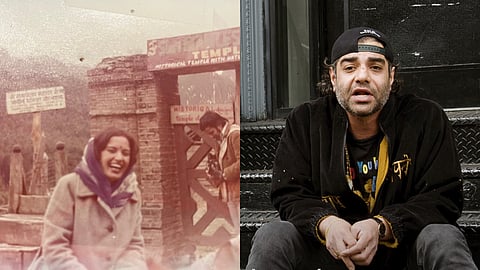
- HOMEGROWN WORLD
- #HGCREATORS
- #HGEXPLORE
- #HGVOICES
- #HGSHOP
- CAREERS
- ABOUT US
- CONTACT US

When art originates from an honest place, it resonates on a deeper emotional level than art for art’s sake. This was the first thought that swept across my mind when I heard Heems’s Sometimes I Feel Like Manto, a freestyle rap from his upcoming album Veena. When lyrical authenticity merges with lived experiences, a gem of a track like this is born. Let us delve into the social, cultural, and historical context of the track, and by extension the themes the upcoming album touches upon.
On August 15, 1947, the jubilant cries of freedom from the colonial yoke were overshadowed by the anguished voices of millions navigating the harrowing aftermath of Partition, amidst a landscape marred by tragedy and loss. Language falls short of articulating the collective trauma faced by the people in nascent Pakistan and India. Sometimes I Feel Like Manto serves as a sincere effort by Heems, an American-born musician of Punjabi-Indian descent, to shed light on the generational trauma passed down in families stemming from the horrific events of Partition. While the artist has touched on the topic of Partition in their previous work, this track delves deeper into the profound impact it has had on their own family and the wider community.
A nation divided, my people they riot
I ask my dad why my grandma ‘s so quiet
I ask my mom why my grandmas not smiling
I ask my therapist why I’m always wilding
This excerpt from the track shows how deeply personal the lyrics are. There is no fancy music video or instruments accompanying the track. The personal is the political and Heems’s track directly embodies that with distinct originality.
Filming the music video in front of Punjabi Deli in NYC holds a special meaning for the artist. In 2015, he actively participated in a petition to expedite construction in front of the deli and establish a nearby taxi relief stand. This initiative aimed to support the deli, which was facing financial difficulties, and prevent taxi workers from receiving parking tickets. The artist's music catalyzes tangible change on the ground, exemplifying their commitment to improving the community they are a part of.
Heems's dedication to activism is not limited to a single track or moment. In 2012, he utilized the Nehru Jackets mixtape to raise awareness about gerrymandering in Richmond Hill and South Ozone Park. Although the desired outcome may not have been fully achieved, the artist witnessed the unification of Richmond Hill with Bellerose as a community predominantly consisting of South Asians in City Council District 23. This demonstrates the artist's persistent efforts to use their music as a platform for social change and to amplify the voices of marginalized communities.
Sometimes I Feel Like Manto is a small taste of what’s to come in Heem’s upcoming album, Veena, which explores the themes of trauma, addiction, spirituality, healing, and growing older. It’s a diverse mix of sounds and performance. As listeners, we have the opportunity to not only appreciate the artist's musical talent but also to reflect on the power of art as a catalyst for social change. Let us embrace the message behind Sometimes I Feel Like Manto and join the artist in their journey towards healing, understanding, and creating a more inclusive society. On a personal note, I'm waiting with bated breath for the album’s release.
Watch the music video of Sometimes I Feel Like Manto below.
Follow Heems here.
If you enjoyed reading this, here's more from Homegrown:
Explore The Golden Age Of Kolkata Indie Rock With Legendary Drummer Nondon Bagchi
Nitin Sawhney’s Latest Album Is A Nuanced Intersection Of Political Art & Fusion Music
Kalimpong Band Gauley Bhai's Transtraditional Sound Is Redefining Homegrown Indie Rock
